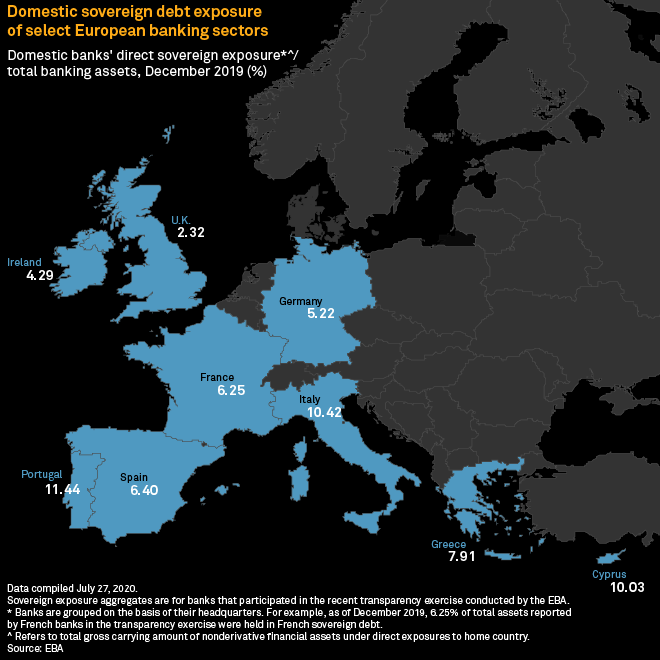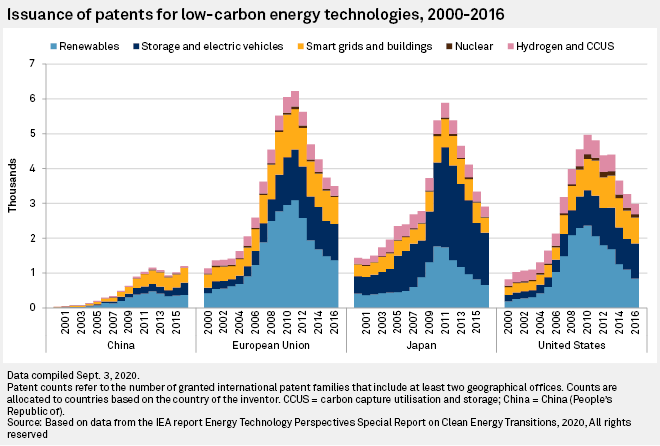Featured Topics
Featured Products
Events
S&P Global Offerings
Featured Topics
Featured Products
Events
S&P Global Offerings
Featured Topics
Featured Products
Events
S&P Global Offerings
Featured Topics
Featured Products
Events
Language
Featured Products
Ratings & Benchmarks
By Topic
Market Insights
About S&P Global
Corporate Responsibility
Culture & Engagement
Featured Products
Ratings & Benchmarks
By Topic
Market Insights
About S&P Global
Corporate Responsibility
Culture & Engagement

European policymakers have pushed ahead with climate-focused policies despite the impact of the coronavirus crisis on their economies. Meanwhile, U.S. Democrats have advocated modern, sustainable infrastructure upgrades and aggressive action on climate change if Joe Biden wins the White House.
Published: October 8, 2020
The EU's proposal for an unprecedented spending package to fuel the bloc's recovery from the coronavirus pandemic has been tied explicitly to green principles, although the plans are still lacking in detail and environmental groups have criticized the continued support for some fossil fuels.
The European Commission's proposal would see the EU raise €750 billion in recovery funds by issuing bonds, with €500 billion doled out to member states in grants and the rest in loans. This comes on top of €540 billion in postcrisis funding already agreed in April and a newly reinforced budget for 2021-2027 to the tune of €1.1 trillion. Combined, the funding amounts to the largest European spending plan ever proposed.
EU Parliament backs 2050 climate neutral law
The European Parliament adopted its negotiating mandate on a proposed EU climate law Oct. 7, seeking carbon neutrality by 2050 and confirming amendments it made to raise the bloc's nearer-term 2030 emissions reduction target to 60% below 1990 levels, the parliament said Oct. 8.
Read the Full ArticleEU Recovery Plan Could act as Lightning Rod for Green Bond Market
The European Union's coronavirus pandemic recovery plan could act as a catalyst for green bonds by providing the basis for a highly rated safe asset and spurring more private investment in the fledgling debt instrument, experts and market participants said.
EU leaders agreed in July to establish a coronavirus recovery fund offering €390 billion in grants and €360 billion in low-interest loans to pandemic-stricken EU countries. It will spend 30% of the money on climate-related projects, sparking hope among green bond specialists that it will reinvigorate the market that has been dogged by poor supply despite increasing investor interest.

The European Union's planned issuance of €750 billion in bonds to fund its recovery program will create a major new player in bond markets for the long term, and it could also ease pressure on the "doom loop" that has bedevilled weaker EU banks and economies, according to market participants. EU leaders reached an agreement in July to establish a coronavirus recovery fund offering €390 billion in grants and €360 billion in low-interest loans to pandemic-stricken EU countries. The EU has departed from its previous policy of not financing deficits and will borrow in the commercial markets to finance up-front transfers.

What The EU Recovery Fund Breakthrough Could Mean For Eurozone Sovereign Ratings
S&P Global Ratings believes that, despite its temporary, crisis-specific nature, the Fund lends itself to becoming a permanent part of the EU architecture, a position supported by the European Parliament, not least because it would guard against unfair competition in the form of extraordinary fiscal support at the national level.
A key feature of the plan is that the supranational body, the European Union, will depart from its previous policy of not financing deficits, and borrow in commercial markets to finance upfront transfers. By issuing debt in the market on this scale, the EU also provides the ECB, as well as investors, with a new liquid euro-denominated benchmark instrument, benefiting the euro's status as a reserve currency.
With the creation of the Recovery Fund, the EU has invested in a shared fiscal response: a key step toward becoming a fiscal union.
If former Vice President Joe Biden wins the presidential election in November, a significant portion of voters will be expecting bold action to implement a federal climate policy and return the US to a position of leadership in combating global warming on the world stage, speakers at the Democratic National Convention said Aug. 18.
Democrats participating in the convention and partner events advocated modern, sustainable infrastructure upgrades and aggressive action on climate change early in the Biden administration if he takes the White House.
Democrats Adopt Platform Promising Strong Action on Climate Change, Energy
During the second day of the Democrat's national convention, the party Aug. 18 announced that it had adopted a party platform that included planks reflecting many of the priorities of progressive climate hawks and the provisions of presidential nominee Joe Biden's climate and clean energy plan. However, the 92-page document does not include several items on the progressives' wish list, such as the elimination of fossil fuel subsidies and tax breaks or prohibitions on fracking.
Read the Full Article
On the list of countries unveiling green fiscal stimulus policies in recent months there is one glaring omission. Despite unleashing $3 trillion of measures to tackle the economic consequences of the coronavirus, the U.S. federal government has channeled just 1.1% toward initiatives that could help its transition to a more environmentally sustainable economy, according to Rhodium Group.

U.S. Electric Storage Industry should Not Bank on Swing in Trade Policy: Attorney
Domestic politics and international trade spats have disproportionately challenged the global supply chain for electric storage, according to one expert on the geopolitical scope of the energy storage market, and these challenges are likely to persist, albeit somewhat moderated, even if there is a change in the White House.
Electric storage is among industries that have been heavily impacted by import restraints, including antidumping and countervailing duty measures and trade tariffs, used with increasing intensification by President Donald Trump, Bernd Janzen, a partner at Akin Gump Strauss Hauer & Feld, said at the Energy Storage Association's annual conference.
Investors remain focused on the energy transition despite coronavirus pandemic related market disruptions, and while there is a long way to go toward decarbonizing society, transparent commodity pricing, clear ESG metrics and continued corporate action can help, experts across S&P Global said Sept. 22.
"COVID is leaving its mark on the world and it is impacting the energy transition," Roman Kramarchuk, head of energy scenarios, policy & technology analytics at S&P Global Platts Analytics, said during a New York City Climate Week event called "Transitioning to a Low Carbon Economy."
The pandemic has reduced global oil demand by about 2.58 million b/d and while that has reduced carbon dioxide emissions it has also resulted in lower oil prices that make electric vehicles less competitive, Kramarchuk said.
Thermal Coal Companies Removed from the S&P 500® ESG Index in Response to Market Demand
After an industry-wide, public consultation that confirmed this shift in investor perception, the S&P ESG Index Series Methodology was updated to exclude thermal coal in an extraordinary rebalance that took effect on Sept. 21, 2020.
Read the Full ArticleESG Comes into Focus for Some Pipeline Firms Seeking New Investors
CEOs of some mid-sized U.S. pipeline companies said attracting new money to the midstream sector requires a bigger emphasis on environmental, social and governance issues as investors increasingly scrutinize energy companies' employee diversity and sustainability practices.
Read the Full Article
